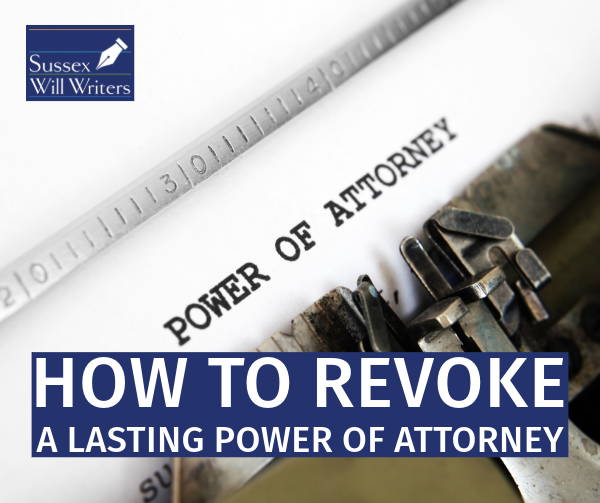
From: The Society of Will Writers
A Lasting Power of Attorney (LPA) is a legal document that allows a person (called the donor) to appoint someone they know and trust (called the attorney) to make decisions on their behalf should they become unable to do so in the future. However, there may be occasions when the LPA needs to be changed and revoked.
How can an LPA end?
An LPA can come to an end if the donor’s attorney:
- No longer has capacity
- Divorces the donor or ends the civil partnership (where the attorney is the husband, wife or civil partner)
- Becomes bankrupt or is subject to a debt relief order in the case of a property and financial affairs attorney
- Is removed by the Court of Protection
- Dies
Why would an LPA need to be revoked?
An LPA may need to be revoked for several reasons, including:
- Appointing a new attorney – the donor may want to appoint a new attorney or change the powers given in the LPA to the attorneys.
- Conflict of interest – a conflict of interest may arise between the donor and attorney where the attorney may benefit in some way from a decision that they are making on behalf of the donor, so the donor may choose someone else.
- Loss of trust or confidence – the donor may no longer trust the chosen attorney, there may be a breakdown in the relationship, or the attorney may make decisions that go against the donor’s wishes or does not act when the donor needs them to which means there is a need to revoke their appointment as attorney.
- Change in circumstances – the donor may have a change in their circumstances such as a new relationship, children, change in health or an attorney may no longer be able to carry out their duties which may require a change or lead to the need to revoke the LPA.
- Misconduct or LPA abuse – if the donor has concerns about the attorney abusing their position, they might seek to revoke the LPA.
How to revoke an LPA
It is important to note that an LPA can only be revoked if the donor has the mental capacity to do so.
The original LPA, along with the written deed of revocation, need to be sent to the Office of the Public Guardian (OPG).
The deed of revocation would need to say as follows:
—
This deed of revocation is made by [your name] of [your address].
1: I granted a lasting power of attorney for property and financial affairs/health and welfare (delete as appropriate) on [date you signed the lasting power of attorney] appointing [name of first attorney] of [address of first attorney] and [name of second attorney] of [address of second attorney] to act as my attorney(s).
2: I revoke the lasting power of attorney and the authority granted by it.
Signed and delivered as a deed [your signature]
Date signed [date]
Witnessed by [signature of witness]
Full name of witness [name of witness]
Address of witness [address of witness]”
—
It is possible to partially revoke an LPA if the donor wishes to remove one attorney for example but have the other appointments still remain if the attorneys are appointed on a joint and several basis.
The donor should notify the attorneys and any organisation that holds a copy of the LPA of the revocation.
The revocation of an LPA is an important decision and it is vital that the donor is aware of the options available to them before action is taken.
For further advice on making or revoking an LPA, give us a call or get in touch using the email below.
 Sussex Will Writers
Sussex Will Writers
Managed and Serviced by Centurion Legacy
T: 0203 900 3050 E: info@centurionlegacy.co.uk